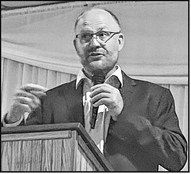OSHA rules raise alarms for fire depts


By Kevin O’Brien
Volunteer fire departments could be forced into extinction if new workplace regulations proposed by the federal government are impl...


By Kevin O’Brien
Volunteer fire departments could be forced into extinction if new workplace regulations proposed by the federal government are impl...